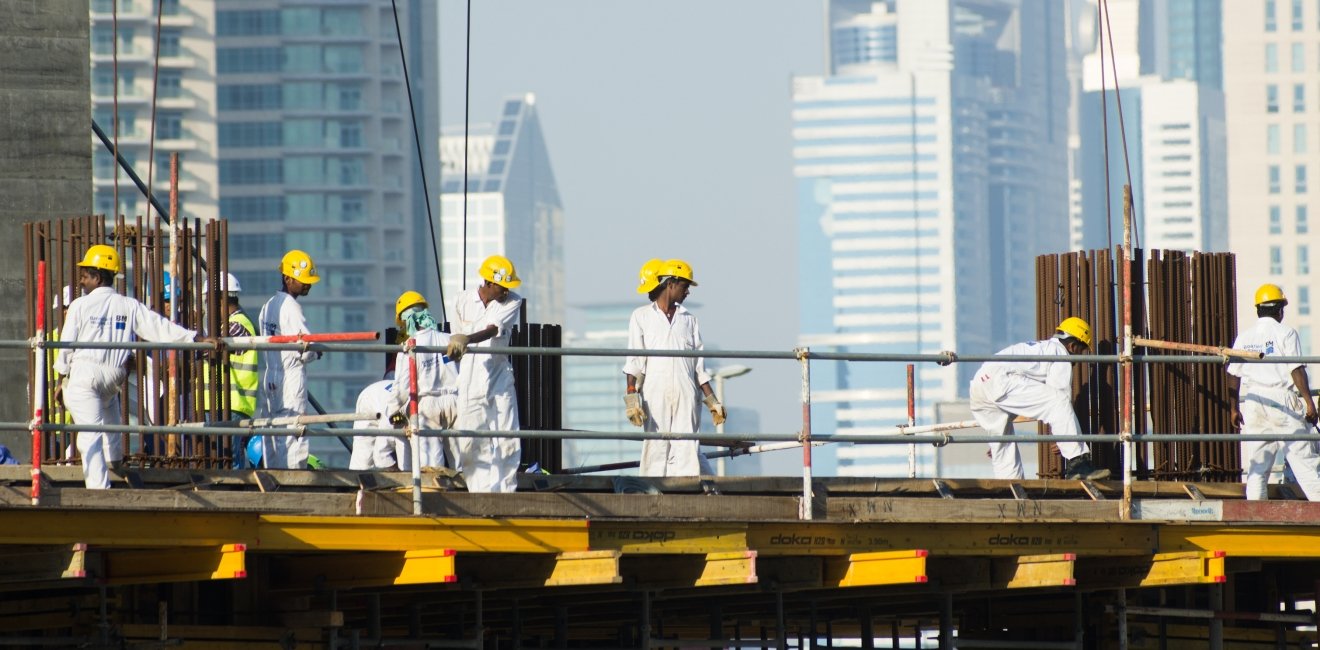As leaders across the Middle East’s Gulf region strive for economic diversification and modernization, they will have to reckon with the more than thirty million migrant workers responsible for supporting the economy. Reform remains elusive as powerful private sector employers stand to profit from cheap imported labor – a critical commodity for fueling post-Covid growth. Yet mounting criticism over unfair practices is forcing authorities to make difficult policy decisions regarding the future of its workforce.
Since the first oil boom of the 1950s, Gulf countries have sourced foreign labor for large-scale infrastructure projects to accelerate economic development. Today, migrants account for an average of 70 percent of the employed population in Gulf Cooperation Council (GCC), and over 95 percent of private sector workers in Qatar and the United Arab Emirates.
The Kafala system is the framework that defines the legal status of most migrant workers in the Gulf region. Local sponsors are responsible for foreigner’s employment, living expenses, and general well-being. However, this arrangement contributes to inefficient labor force dynamics. Migrants are recruited on time-limited contracts to work for a specific employer and cannot easily switch jobs. According to the International Labor Organization (ILO), low labor mobility keeps wages low, leading to poor productivity and investment. This fuels two persistent economic challenges facing the region: employed citizens prefer higher wage ‘safe’ jobs in the public sector and the growth potential of private sector companies remains narrow.
Employers frequently withhold compensation and food allowances, confiscate workers’ passports... and prevent them from leaving their residences outside of work hours.
Negative economic consequences of the Kafala system are coupled with deep-seated humanitarian concerns. Employers frequently withhold compensation and food allowances, confiscate workers’ passports, require them to work overtime without compensation, and prevent them from leaving their residences outside of work hours.
The challenge of reform
In the past few years, Gulf countries started to dismantle core pillars of the Kafala system. In 2020, Qatar became the first country to allow migrant workers to quit or change jobs. Kuwait and Saudi Arabia followed with similar measures, although only after the employee completes one year of work. As of 2021, migrant workers in all GCC countries except Saudi Arabia can leave the country without explicit permission from their employer.
Authorities in the Gulf argue these measures have effectively abolished the Kafala system. Although, barriers remain in place that continue to deny foreigners equal rights in the workplace. For example, measures passed in Saudi Arabia to loosen restrictions on migrant workers will not touch an estimated 3.6 million migrant workers, mostly domestic workers and farmers, who are already the most vulnerable and least protected.
Furthermore, governments do not bolster legislative measures with proper monitoring and enforcement mechanisms. Omer Karasapan, former MENA Region Knowledge and Learning Coordinator at the World Bank, notes, “Employers are going to stand in solidarity with each other to ensure there is not as much labor mobility as these laws seem to promise.” Policies are therefore ineffective if employers are not held accountable.
Citizens have come to expect cheap imported labor will fill positions they view as undesirable, such as construction and household work.
Private sector employers are not the only beneficiaries of the Kafala system. Citizens have come to expect cheap imported labor will fill positions they view as undesirable, such as construction and household work. According to Karasapan, the government, “provides citizens with jobs in the public sector; while you look at the private sector and nearly 80 percent are foreigners… This is an expectation that is built into the overall social contract.”
The overhauls needed to decrease dependency on migrant labor will be costly to large private sector employers, as well as challenge deeply held beliefs about what jobs are ‘appropriate’ for nationals. While the long-term payoff is a more sustainable and dynamic economy, the transition period will be painful and unpopular. So far, policymakers in the region laud themselves for disrupting the status quo; however, they have only half-heartedly implemented reforms to prevent domestic pushback.
Covid-19 interrupts progress
Today, the Covid-19 pandemic is reversing the already limited policy gains in labor mobility and reinforcing the power imbalance between migrant workers and their sponsors.
The sectors most heavily impacted by Covid-19 restrictions are also the largest employers of migrant workers, namely construction, hospitality, and transportation. Employers across the region reduced the hours and wages of migrant workers, and in some cases terminated their contracts altogether, without first consulting the employees. Thousands of migrants with terminated contracts were ordered to leave the country, yet most could not afford a return flight, particularly those who were not fully compensated. For the first half of 2020, many could not leave because their origin country banned international flights, including from the Gulf. These unemployed migrants struggled to access food and shelter, relying on charity to support themselves and their families.
Many judicial systems in the Gulf closed or reduced their workload to essential cases, which exacerbated the struggle to seek justice for labor rights violations – already a multi-year process. Migrants who were able to return home will likely never receive reimbursement for unpaid or incomplete wages, although they are legally entitled to reparations even after leaving the country. The absence of justice signals to employers that non-compliance will go unpunished.
Employers will continue to exploit non-national employees to compensate for the cost associated with nationalization.
Authorities across the Gulf also enacted nationalization policies to limit the impact of Covid-19 on households, at the expense of foreigners. Saudi Arabia and Oman restricted the employment of migrant workers in certain sectors, such as transportation and retail, to reserve openings for citizens, and the UAE restricted employer’s ability to change citizen workers’ hours and salaries, leaving out similar provisions for foreigners. Most remarkable, legislation passed in Kuwait aims to “rebalance the country’s demographics” by reducing the migrant proportion of the population from 70 to 30 percent. The proposal outlines a plan to both limit the issuance of visas and physically remove foreigners from the country. These polices notably do not protect migrant workers; instead, employers will continue to exploit non-national employees to compensate for the cost associated with nationalization.
The role of the international community
Qatar’s successful bid to host the 2022 World Cup shined a light on the Gulf’s Kafala system. Human rights groups, leaders of football associations, and even players themselves have been speaking out against the inadequate working conditions for foreigners in Qatar. This criticism, however, appears to be moving the needle. In 2020, Qatar passed groundbreaking legislation to improve conditions for migrant workers, becoming the first Gulf country to allow workers to switch jobs before their contract has expired and the second to set a minimum wage for migrant workers.
Both the resources and watchful eye of the ILO have proven critical to support legislative progress.
According to an ILO representative, the scrutiny not only pushed the government to enact reform, but also put in place mechanisms of enforcement. “That has meant there is a multiyear program and high-level support for ongoing series of reforms. Whereas in other countries in the Gulf, we do not have that visibility and high-level buy-in.” In 2017, the ILO opened a branch in Qatar and ‘Kafala reforms’ are listed at the top of Qatar’s labor reform objectives. The organization cites meaningful progress in worker mobility, in addition to other concerns like occupational safety, access to justice, and representation on labor committees. Both the resources and watchful eye of the ILO have proven critical to support legislative progress.
In addition to maintaining pressure on Gulf leaders, she urges experts to bring awareness to international labor standards that protect all employees and foreign laborers. ILO Convention No. 111, ratified by most countries in the region including Qatar, prohibits discrimination on the basis nationality and other factors. Qatar also drew on key principles in the Minimum Wage Fixing Convention (No.131) to become the only Middle Eastern country that ensures a non-discriminatory minimum wage for all workers, including household help.
However, despite the promising reports, migrant workers in Qatar still face many humanitarian hardships. Laborers of the World Cup stadium and related infrastructure are subject to over 60-hour work weeks in temperatures that can average more than 105 degrees Fahrenheit in the summer. According to Human Rights Watch, employers routinely refuse to compensate for overtime and arbitrarily withhold payment. For example, migrant workers at the Bin Omran Trading and Contracting Company have not been paid for up to five months, despite multiple formal complaints to authorities. In response, Amnesty International and other rights groups urged the International Federation of Association Football (FIFA) to earmark $440 million as compensation for foreign workers subject to human rights abuses.
Looking ahead
Governments across the Gulf region are investing billions of dollars to diversify their economies and drive post-Covid recovery. A dynamic economy, however, requires accountability and good governance in the workplace. This will not be achieved so long as private employers, and frankly government authorities, continue to trample the rights of a huge sector of the labor force. If migrant workers gain greater job stability and mobility and higher wages, they will be less dependent on employers for providing basic needs. Higher wages will also support skill-building among migrant communities, injecting new talent into the economy and potentially breaking generational cycles of poverty. Employers’ costs will be directed to more productive investments, such as acquiring new technology and attracting more skilled laborers, rather than the sunk costs of migrant housing, food, transportation, and policing.
Policymakers must also remedy the setbacks experienced during the Covid-19 pandemic. Efforts to enhance employment of nationals in the private sector is necessary, but the strategy of shutting out migrant workers is less effective or beneficial. They will continue to be an important source of labor in the Gulf, particularly as governments seek to accelerate economic recovery from the pandemic era. Eliminating that supply of labor will only inhibit private sector growth, fueling the low-wage, low-investment cycle.
The Kafala system, as it stands today, is a major drain on the Gulf’s economic potential, and perpetuates human rights violations against millions of workers. A targeted, thorough reform agenda will both generate and free up resources to tackle some of the region’s most entrenched economic barriers.
The views expressed in these articles are those of the author and do not reflect an official position of the Wilson Center.
Author


Middle East Program
The Wilson Center’s Middle East Program serves as a crucial resource for the policymaking community and beyond, providing analyses and research that helps inform US foreign policymaking, stimulates public debate, and expands knowledge about issues in the wider Middle East and North Africa (MENA) region. Read more


The MENA Workforce Development Initiative
The Middle East and North Africa Workforce Development Initiative (MENA-WDI) aims to assess both current and projected challenges facing the region in developing the workforce and the implications for peace and stability. Read more

Explore More
Browse Insights & Analysis
360° View of How Southeast Asia Can Attract More FDI in Chips and AI



